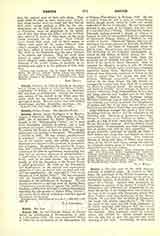

Aranda, PHILIP, Jesuit theologian, b. at Moneva, Aragon, February 3, 1642; d. at Saragossa, June 3, 1695. He is described by Father Michel de St. Joseph, in his “Bibliographia Critica”, as “a most acute theologian, eloquent in speech, and a most practical and expert athlete in the scholastic arena”. He entered the Society of Jesus in 1658. He taught philosophy and theology at Saragossa. He published a treatise in 1693, “De Deo sciente, praedestinante et auxiliante”, which examines ably the entire subject of the scientia media, and solidly and subtly expounds and illustrates the questions of predestination and grace. He explains the mind of St. Augustine, and “without difficulty”, it was said, “gave the meaning of his difficult expressions, maintaining that they had no reference whatever to predestination”; a word which he contends was never, even equivalently, used by the great Doctor. He adds an appendix on why the procession of the Second Person is called generation. He wrote on the Incarnation and Redemption; on the natural and supernatural operation of man; on human acts; on good and evil; and the supernatural. He wrote also a “Life of the Servant of God, Isabel Pobar”. He was connected with the Inquisition of Aragon and was synodal examiner of the Archdiocese of Saragossa. He was fiercely attacked in a satirical work by Martin Serra, a Dominican, who declaimed against “the indifferent, headless, inefficacious writings of certain theologians, especially the olla podrida of Father Philip Aranda”, an assault which almost evoked an interdict against the church of the friar.
T. J. CAMPBELL

